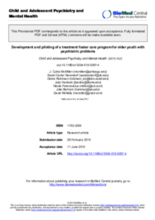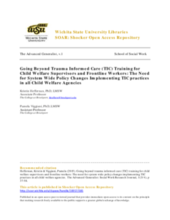Displaying 331 - 340 of 525
This webinar from Faith to Action Initiative presents key strategies for expanding the capacity of families to care for orphans and vulnerable children.
Using cross-sectional data from rural left-behind children aged 10–17 years in the Henan Province of China, the present study examined the roles of father–child cohesion, mother–child cohesion, and friend companionship in emotional adaptation (loneliness, depression, and life satisfaction) among children left behind by both of their rural-to-urban migrant parents compared to those with only a migrating father.
This paper reports on the development and piloting of a manualized treatment foster care program in the US designed to step down older youth with high psychiatric needs from residential programs to treatment foster care homes.
This article reports on the Western Uganda Bantwana Program, which worked with more than 1,000 HIV/AIDS-affected families with the goals of improving socioeconomic status, psychosocial functioning, and educational participation.
This qualitative study focused on disadvantaged women in the US child welfare system who have lost their parental rights.
This article reviews current efforts to train child welfare workers in the US in trauma informed practices and argues that trauma informed care adaptation and training must transcend case workers and supervisors in order for true systemic change to occur.
CP MERG hosted a webinar on 27 May 2015 entitled “Evaluating Protection and Psychosocial Support in the Context of Humanitarian Settings” and now the webinar recording and powerpoint presentations are available on the CP MERG website.
These videos demonstrate the importance of mentoring not only for vulnerable and foster youth, but also for the mentors themselves.
The aim of this research was to explore and describe the lived experiences of children living on the streets of Hillbrow, Johannesburg, with a focus on children’s mental health and wellbeing.
This document, developed through a mapping exercise conducted by the National Council for Children’s Services (NCCS) and the Department of Children Services (DCS) of Kenya, provides a comprehensive list of the agencies and programs in Kenya that provide services for children.



